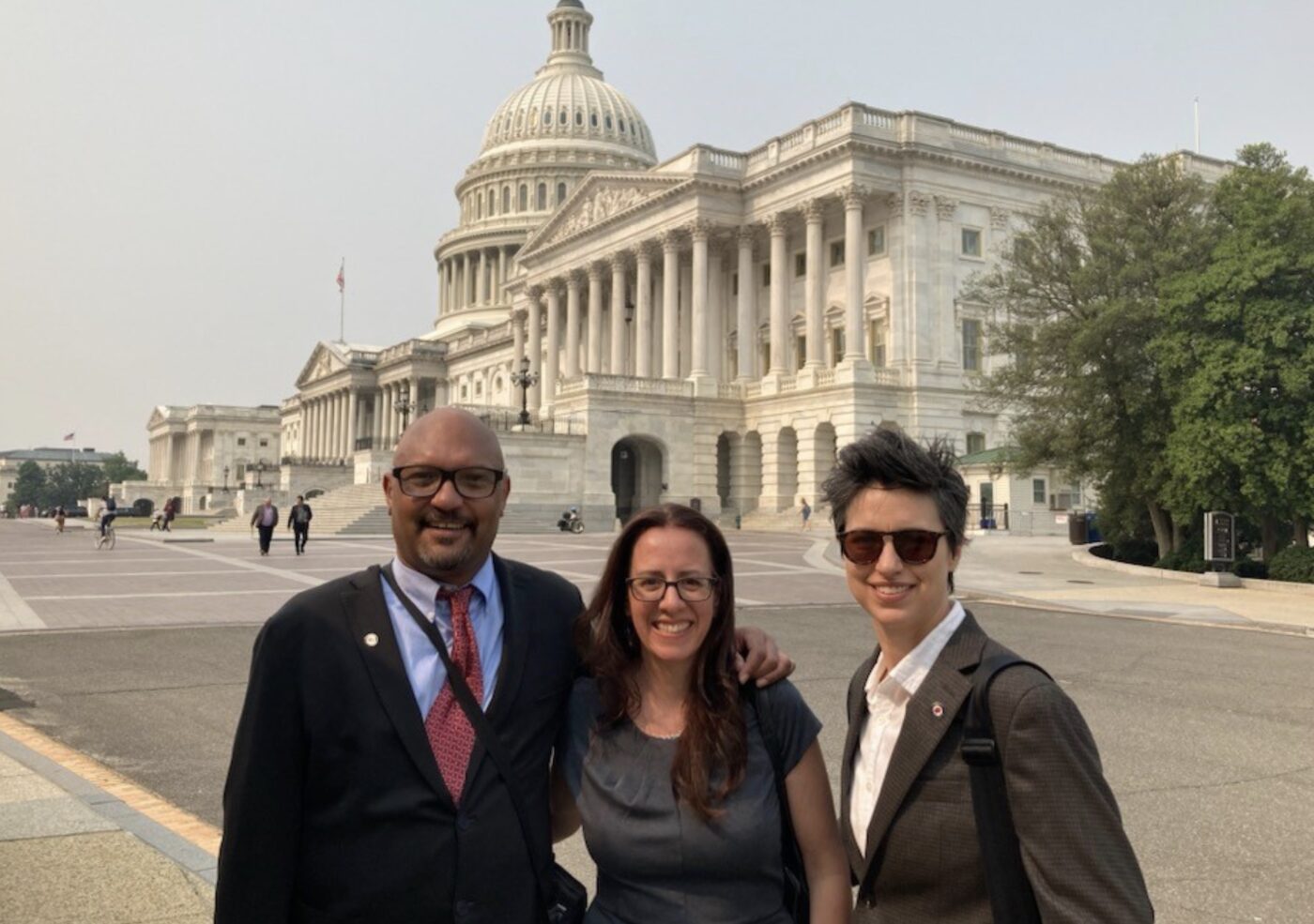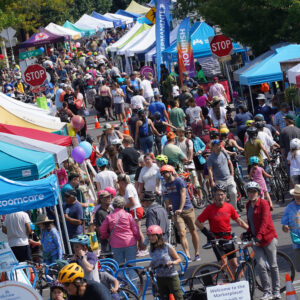
Members of an influential Metro committee spent this week in Washington D.C. in hopes of bringing back federal funding for a host of major projects. The annual trip includes one day of meetings with members of Congress and a visit to U.S. Department of Transportation headquarters.
The 16-member Joint Policy Advisory Committee on Transportation includes county commissioners, mayors and agency directors from across the region. Among those who attended this year’s trip was Portland Bureau of Transportation Commissioner Mingus Mapps and PBOT Interim Director Tara Wasiak.
On Tuesday, the group met with nine members of Oregon and Washington’s congressional delegation. The schedule included meetings with House representatives (and/or staff members of) Marie Gluesenkamp Perez, Andrea Salinas, Cliff Bentz, Lori Chavez-DeRemer, Earl Blumenauer, Suzanne Bonamici, and Val Hoyle. They also met with Senator. Ron Wyden.
On Tuesday night, TriMet hosted a dinner and reception on the rooftop of an office building two blocks from the Capitol where the special guest was Senator Jeff Merkley.
In addition to the requisite networking and rapport-building, they had more serious business to discuss. With Biden’s infrastructure law going full steam, JPACT members want to make sure our region gets as much funding as possible, “and that the funds from the legislation help all our communities prepare for the future ahead,” reads a Metro document about the trip.
In addition to being ready to discuss several high priority issues like climate change, electrification, safety and high capacity transit, the JPACT members lobbied specifically for 12 major projects they hope the Biden Administration will help pay for. Those projects include:
82nd Avenue Transit Project – $250-450M: Replacing TriMet’s Line 72 with Bus Rapid Transit to serve diverse communities in Portland and Clackamas County.
Broadway Corridor Streets – $22M: Constructing two new streets critical to unlocking four million square feet of mixed-use, mixed-income, urban development at the former US Postal Service site in Portland’s Central City.
Earthquake Ready Burnside Bridge – $895M: Replacing an almost century-old bridge to secure one of the most dependable emergency routes in the region and create thousands of local jobs.
I-205 Improvements Project – $550M: Adding a missing third lane, seismic upgrades to a total of nine bridges, and safety improvements to interchanges and on- and off- ramps.
I-5 Rose Quarter Improvement Project – $1.45B: Improving safety and congestion at Oregon’s top freeway bottleneck, while reconnecting the heart of Portland’s Black community.
Interstate Bridge Replacement Program – $6B: A modern, reslient, multimodal span across the Columbia River.
Montgomery Park Streetcar Extension – $80M: A new 1.3 mile transit connection in Portland’s vibrant and growing northwest neighborhoods.
SW 185th MAX Overcrossing – $85M: Building a grade-separated light rail crossing over busy SW 185th Avenue to improve transit reliability, make crossings safer and reduce congestion.
Sunrise Corridor – $500-700M: Planning, design and construction of a community-supported multimodal transportation solution for Highways 224 and 212.
TriMet Zero-Emission Bus Transition – $2B: Advancing TriMet’s commitment to a zero-emissions fleet by purchasing buses and constructing associated bus operation facilities.
Tualatin Valley Highway Transit Project – $250-385M: Improving speed, reliability, accessibility and safety for transit riders, and in particular for communities of color and low-income communities.
Take a look at the official delegation packet here (PDF).
Then on Wednesday, JPACT members attended several meetings at the USDOT where they met with various high-level staff including Director of the Departmental Office of Civil Rights Irene Marion and the Executive Director of the Joint Office of Energy and Transportation Gabe Klein. In the afternoon they could choose between two activities: a visit to the African American Museum (with free tickets from Senator Merkley) or a bike share ride.
I’ve reached out to Commissioner Mapps to see if he’d like to share any reflections from the trip, but he might be traveling home at the moment. I’ll update this post if I hear back. In the meantime, we have a tweet he shared yesterday while standing outside the capitol with his Chief of Staff Katie Meyer and PBOT Interim Director Tara Wasiak. “Air quality here is like Portland circa Sept. 2020, due to fires in Canada. A reminder that new transportation improvements must achieve our climate goals and combat climate change.”







Thanks for reading.
BikePortland has served this community with independent community journalism since 2005. We rely on subscriptions from readers like you to survive. Your financial support is vital in keeping this valuable resource alive and well.
Please subscribe today to strengthen and expand our work.
“Adding a missing third lane” is certainly one of the more unique ways to say “Widen an urban Freeway” that I have heard. Disappointing to see so much money being asked for to make the region even more car dependent.
They’re also saying again that widening I5 will improve congestion and still misleading people about the safety improvements along there. ODOT has admitted in numerous report, meetings, and statements that it will not improve congestion but instead increase throughput. For anyone not familiar with ODOT doublespeak that means the same congestion with more cars and more pollution. As far as the safety improvements go there was what 1 death along that section in over a decade most of the accidents are fender benders.
If ODOT cared about safety they’d fix their abandoned highways like Powell and 82nd. They only funded and transferred 82nd recently because of pressure from Hardesty, Pham and Brown after multiple people died in a short time. They could care less about safety. In fact in the name of safety they’re widening Powell as we speak. Sure they’re going to add a sidewalk but the main goal like it always is, is to increase throughput. As an added bonus they’ve cut down hundreds of old trees to make room for this wider road.
Damn it, I hate when one of my lanes goes missing. Where did it go?!
Have they tried putting the missing lane on a milk carton? Maybe it just ran away from home.
A “missing third lane” is doing olympic levels of heavy lifting for a ~7mile highway expansion project. I hope the No More Highways group has this on their radar, it is a dangerous project in a corridor that already sees massive heat islands and heat domes.
I guess its too much to ask that they simply try to get money to fix the stuff thats already broken rather than asking for money to spend on new things that will soon need more money as they will be broken soon enough.
https://bikeportland.org/2022/11/02/whats-behind-pbots-4-4-billion-street-maintenance-backlog-excuse-366371
It’s federal money. Always smart to advocate that Portland gets its fair share. Thank you Mingus.
Federal grants are a lot like “cents-off coupons” for Cheerios – you have to pay a “local match” of 20% to 90% to get that federal funding, money that would otherwise go to some local priority like barrier-protected bike lanes.
Cool. Maybe Mapps can bring home some federal cash for needed safety improvements in Portland and decrease the pressure on taxpayers here who are paying a lot but getting a little.
crazy how cheap streetcars are compared to building roads
I wish that they made improvements to the i205 MUP instead of the polluting car highway.
I’m sure all this travel back and forth across the country is as “green” as possible.
I’m sure the above comment is motivated by authentic and deeply-felt concern for the environment and for sustainability.
Well if I told you I don’t own a car or fly on airplanes would that matter? At least I put my money where my mouth is.
It would make me kind of sad because individual actions have no impact on ecocide.
Well in that case just get back in your Chevy Suburban and ease on down the road.
The project that I would really like to see get funding is the 82nd Avenue Transit Project. Line 72 is the City’s most popular bus route according to Trimet’s Ridership Reports and 82nd Ave is prime for BRT. If Trimet can take the lessons learned from the FX2 and make a real BRT happen in Portland, it would be huge.
Yesterday I took the train from New Haven CT through NYC to make a train connection in DC. Hazy smog everywhere.
$7.5 billion (plus) for two wrong-headed I-5 freeway expansion projects.
Show me your budget and I tell you your priorities.
Do it better, Mapps!